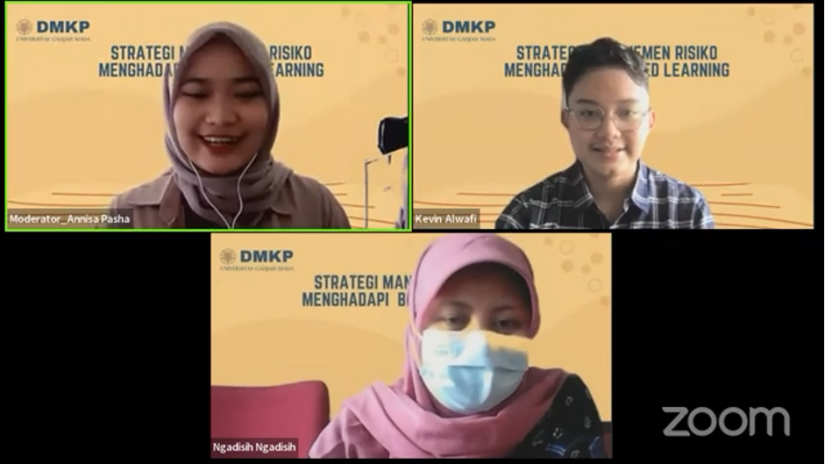
Yogyakarta, November 25th 2021─Along with the development of the pandemic which began to decline, face-to-face learning policies began to be discussed by universities. However, on the other hand, there is a dilemma for both lecturers and students caused by online habits for almost two years. Therefore, the Department of Public Policy Management (PPM) of the Faculty of Social and Political Sciences of UGM held a webinar about risk management. This webinar, which was held via Zoom and YouTube, aims to find out how the university’s risk management strategy is to deal with blended learning. This webinar presented lecturer representatives, Dr. Eng. Ngadisih, STP., M.Sc., who is also part of the Center for Innovation and Academic Studies (PIKA) of UGM, and student representatives, M. Kevin Alwafi, a student of the Department of PPM of UGM.
On that occasion, Kevin expressed his concern about the blended learning policy from the student’s point of view. On the one hand, blended learning is eagerly awaited by students for several reasons, including the possibility of better interaction with teaching staff, a campus environment that supports teaching and learning activities, as well as accessibility to campus facilities which have long been limited. However, on the other hand, he also conveyed doubts and concerns about the policy, “Starting from the risk of the spread of COVID-19, differences in understanding between offline and online students, to the possibility of parents not allowing it,” Kevin explained.
Responding to the above, the lecturer who is familiarly called Asih admitted that there was indeed inertia that occurred on the part of the lecturers and students. On the one hand, online learning that has become a habit creates a sense of comfort. However, on the other hand, there is a need to improve the quality of education through evaluation of the implementation of learning activities every semester. On the occasion, Asih said that PIKA had conducted a survey on the need for the implementation of the learning activities to support the achievement of learning competencies. As for 585 respondents, 54.2% of respondents said they needed a mixed learning method, 34.25% needed offline learning method, and 11.6% needed online learning method. The survey became the basis for deciding the policy on guiding the implementation of learning activities for the odd semester of the academic year of 2021/2022, which was submitted through the Rector’s Letter Number 2681/UN1.0/SET-R/KR/2021 which recommended preparing the implementation of mixed learning method. The survey results also show that the assessment carried out has been able to demonstrate independence, honesty, discipline, responsibility and achievement of CPMK. Even so, Asih admits that there is a need to improve the quality of interaction during online lectures. Given, there are 44% of respondents who feel that the quality of interaction is still lacking. “This is in line with the students’ concerns and concerns that have been conveyed previously,” Asih added.
With the results of the evaluation and survey, Asih conveyed several evaluation notes of online learning for the even semester of 2020/2021. Starting from the need to increase the integrity and responsibility of students during online learning, to optimizing the online learning method which is innovative, creative, and not burdensome, to assistance in costing during online learning for students.
